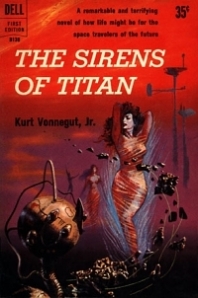 The big deal is this: representing science fiction as a jumbled, juxtaposed mass of gee whiz elements, great for special effects, is just not fair! And, we see it all the time in blockbuster science fiction films. The obvious intention being to entertain, but to call what we see science fiction or imply, infer or state that it is good or great science fiction is wrong. Good science fiction, whatever the definition, involves the use of the brain to process ideas as well as emotions. Of course, that’s why it’s called the “literature of ideas.”
The big deal is this: representing science fiction as a jumbled, juxtaposed mass of gee whiz elements, great for special effects, is just not fair! And, we see it all the time in blockbuster science fiction films. The obvious intention being to entertain, but to call what we see science fiction or imply, infer or state that it is good or great science fiction is wrong. Good science fiction, whatever the definition, involves the use of the brain to process ideas as well as emotions. Of course, that’s why it’s called the “literature of ideas.”
Although there are more authoritative sources, one only needs the online source, Wikipedia, to get an idea of the broad base of science fiction definitions, and not be overwhelmed. There are two separate pages: 1) literature genre and 2) film. Check out this link from the University of Michigan about the various types of science fiction literature, and this link from SciFi Lists.
As broad as those definitions are, the best to me seems to be the notion that science fiction (SF) genre exists as a way of communicating with society about humanity’s relationship with science and technology.
In Makr’s Shadow is a story about what happens a man creates a machine smarter and able to evolve faster than all humanity, but it means more than that. The story is an entertaining conveyance of a deeper message. Kurt Vonnegut, Jr. uses The Sirens of Titan, not only as a vehicle to parody science fiction, employing as many SF devices as possible, but also to discuss something else he thinks is more important. The deeper question is not the parody (although entertaining), but contained within the whole piece. For both novels, even if you don’t understand the underlying message, you will still be remarkably excited by the adventures.
In Makr’s Shadow, the obvious man against machine conflict sets the stage to say something more. For humanity, the obvious underdog, the fight against the machines seems hopeless, so what is the real conflict here? It has to be something deeper.
Violence (human against human) exists in every quarter of society today, but in my future world–In Makr’s Shadow, technology is the villain, so most of the violence is machine against man and vise versa. However, that’s where it stops.
The world we see is in the middle of war against machines, but the war is not what propels the action. Harry, an Insider, who has the ability to see through the fantasy to reality, is the impetus. His drive to know the truth affects the world.
The obvious is not so obvious anymore. The war is an element as entertaining as it may be; however, is not the most important idea…although a reader could be content reading the novel as a simple adventure tale.
There are human questions like how others perceive us, how we see ourselves and what is best for us–or for others are what we struggle with everyday. What is it we have over the machines that make us at least as powerful?
When you add the “evolving artificial intelligence” to the equation, the answer is far more complicated.
The question becomes about power: who has it and what do we do with it?
The machines are limited by logic. We, humans are not. Human behavior is irregular, but not a defect. We have the ability to be spontaneous; the machines do not. There are quite a few moments where the conflict is man against man, but that happens in any fractured and stressed society–like the one we live in. Here, In Makr’s Shadow, the conflict really becomes man against himself.
Humans have psychological and sociological reactions to this dark reality. Some become twisted and hateful, some grow in positive ways, becoming leaders and even heroes. Some conflicts are baser as a young woman fights back against a human who tries to rape her, and the violator is punished immediately without trial or hearing.
 Sexuality is generally treated with satire, and in a love story, and yet the novel’s essence is about discovering truth (why I am the way I am). “What are we?” is a trivial human question in comparison, but still important nonetheless. In Kurt Vonnegut, Jr.’s The Sirens of Titan, he explores the sophomoric question of purpose in the universe. Why do we exist?
Sexuality is generally treated with satire, and in a love story, and yet the novel’s essence is about discovering truth (why I am the way I am). “What are we?” is a trivial human question in comparison, but still important nonetheless. In Kurt Vonnegut, Jr.’s The Sirens of Titan, he explores the sophomoric question of purpose in the universe. Why do we exist?
Science fiction can explore many issues–some quite basic–and some quite deep. It can provide a platform for addressing and discussing sensitive issues we may not want to confront head-on. Using extraterrestrials in a story allow us discuss certain aspects of society we might find uncomfortable like racism, sacrificing a few to save many, positive and negative effects of cloning, the same of religion, etc. It can teach like a fable or a fairy tale. Often, SF is exactly that. In fact, In Makr’s Shadow, could easily be considered a fable or fairy tale with science as the magical force that affects everyone.
In fighting to save their world and their humanity, my heroes, physically and mentally, must confront the world they nearly destroyed. Once they understand, they don’t know what they can do about it. Why would anyone give up a world so perfect? It’s about choices we make, and about what makes us unique in the universe–even unique among other humans.
The exciting “action” is in the backdrop of a war against lethal machine-made weapons and the artificial intelligence that created them. In fighting what seems to be an unwinnable war, humans face their own demons–their own nature.
The thought-provoking underlying question is: are humans worth saving? They face their own splintered society, face universal fears and persevere. The story twists and turns as our heroes uncover myths of their own making.
And, the ending…well, let’s just say it should surprise you. If not, e-mail me and let me know. The best news is that the price of this fantastic ebook is a mere $2.99 at Amazon, Barnes and Noble, Kobo and other retailers of ebooks. You can also go direct to Smashwords.com and download it in virtually any format.